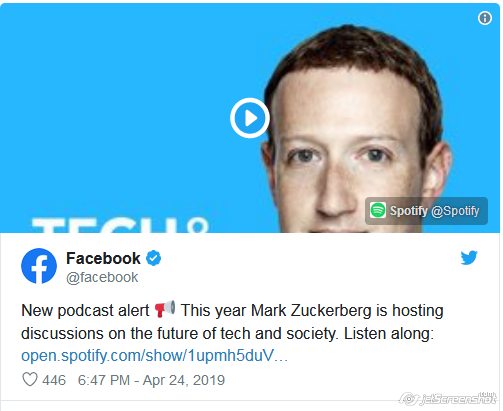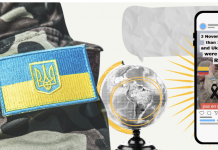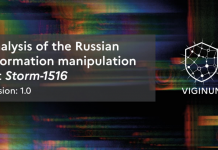By Christine Schmidt, for NiemanLab
Facebook knows it screwed up, is trying to do better, and is spending some of this year actually listening to critiques and suggestions (supposedly). Zuckerberg even has a podcast now!
New podcast alert 📢 This year Mark Zuckerberg is hosting discussions on the future of tech and society. Listen along: https://t.co/5rIBdrbsb5
— Facebook (@facebook) April 24, 2019
But seriously, Facebook and a coalition of social science researchers have announced a group of 60 academics who will have access to some internal Facebook data to analyze “the role social media has on elections and democracy and help Facebook and other companies improve their products and practices.” That’s Facebook’s wording, but the company was not involved in the decision-making process, and it is not providing funding for the research either; that’s coming from eight foundations, including Knight, Charles Koch, and Omidyar Network.
(Facebook has also emphasized the secure system it’s building to share the privacy-protected data with the researchers, since, you know, their past process for sharing data wasn’t the greatest.)
The Social Science Research Council, an independent nonprofit research organization, and Social Science One, a new academic/industry partnership incubated at Harvard to collaborate with Facebook, took the lead on determining the research grantees:
These grantees will seek to use access to Facebook data to better explain how political news is shared in European multiparty political systems; to understand how social events or technology platform changes influence communication behaviors such as spreading disinformation; and to deepen our knowledge of how social media platforms were used in elections in Italy, Chile, and Germany and how their use may influence public opinion in Taiwan.
Below is the full list, with abstracts in the links. But you won’t see any from Africa, home to 17 percent of the world’s population, though the council notes in its announcement: “The grant projects we announce today hint at the global potential of the Social Media and Democracy Research Grants competition.”
- Measuring the effects of peer sharing on fake and polarized news consumption, led by Northeastern University’s Nicholas Beauchamp of the political science department;
- How hyperlink sharing on Facebook influences civic engagement and elections in Taiwan, led by National Chengchi University’s Pai-lin Chen of the journalism department;
- “I read it on Facebook”: How do conversations on social media escape the agenda-setting of news media?, led by Jean-Philippe Cointet from Sciences Po’s medialab;
- Understanding problematic sharing behavior on Facebook, led by Ohio State University’s R. Kelly Garrett;
- Patterns of Facebook interactions around insular and cross-partisan media sources in the run-up of the 2018 Italian election, led by Fabio Giglietto of the Università di Urbino Carlo Bo;
- Mapping disinformation campaigns across platforms: The German election, led by political data science professor Simon Hegelich from the Technical University of Munich;
- The role of Facebook in legislative campaigns in Chile (2017), led by Juan Pablo Luna at the Pontificia Universidad Católica de Chile;
- Characterizing mainstream and non-mainstream online news sources in social media, led by Virginia Tech computer science assistant professor Tanushree Mitra;
- The demographics of the sharing of hyperpartisan news in Brazil, led by University of São Paulo’s Pablo Ortellado;
- SHARENEWS: Predicting the shareworthiness of “real” and “fake” news in Europe, led by Damian Trilling from the University of Amsterdam;
- Studying polarization, misinformation, and manipulation across multiple platforms and the larger information ecosystem, led by New York University’s Joshua Tucker, a professor in politics, Russian and Slavic studies, and data science;
- Fake news on Facebook during the 2017 Chilean elections: Analyzing its content, diffusion, and audience characteristics, led by Sebastián Valenzuela and Magdalena Saldaña from the Pontificia Universidad Catolica de Chile.
By Christine Schmidt, for NiemanLab





